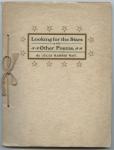Text By: Strong School 7th and 8th Graders, 2011-2012

Julia Harris May poetry collection, 1903
Farmington Public Library
The May Sisters, Julia and Sara
Julia Harris May was born April 27, 1833, and Sara Rice May on April 27, 1835, in Strong, the daughters of Rev. William and Delia M. May. Their father was the local Congregational pastor, and the importance of faith, decorum, and education was stressed. Both of the girls were excellent students and continued their education, even after their father died, attending Mt. Holyoke Seminary. After teaching school in Kentucky for a time they returned to Maine.
The sisters operated a private school for girls in Farmington, known as Wendall Institute, for 13 years. Thereafter they were convinced to move their school to Strong, where they operated the May School until Sara's death on December 30, 1888. Julia's grief was so great that she was unable to continue and spent her time writing poetry, much of which was published. Julia died May 6, 1912, in Auburn. They are buried in modest graves in Strong Village Cemetery.
Thanks to the efforts of a group of grateful students, the grave marker was replaced with a 10 foot tall monument. This monument honors them for their service to local education.
Elizabeth Anne Chase Akers Allen
Another interesting Strong native was Elizabeth Anne Chase, born in Strong, October 9, 1832. Elizabeth grew up in Farmington, where she attended Farmington Academy, later called Maine State Teachers College. She is said to have had a poem published in the Boston Olive Branch at the age of 15.
In 1851 she married Marshall S. M. Taylor, and within a few years they were divorced. She took a job on the Portland Transcript in 1855, and the next year published her first book of poetry, Forest Buds from the Woods of Maine, under the pseudonym Florence Percy. With the profits from that book, she traveled to Europe in 1859–1860. During that journey she served as a correspondent for the Transcript and for the Boston Evening Gazette. From Rome she also sent stories to the Saturday Evening Post of Philadelphia. The poem entitled “Rock Me to Sleep,” whose opening lines, “Backward, turn backward, O Time, in your flight, And make me a child again, just for tonight!”, became very popular here in America. That poem remained by far her best known, even though she published many poems, often in the Atlantic Monthly. As Elizabeth traveled she would often include personal stories and comments in her writing based on the challenges that she faced being a female traveler in Europe.

Elizabeth Akers chain and locket, ca. 1860
Maine Historical Society
In August, 1860, she married Benjamin Paul Akers. He was a Maine sculptor whom she had met in Rome. Sadly he passed away the next year, after suffering from tuberculosis. From 1863 to 1865 she worked as a government clerk in Washington, D.C.
In 1865 Elizabeth married Elijah M. Allen. A collection of her poetry, entitled simply, Poems, was published in 1866, under the name Elizabeth Akers. The book included “Rock Me to Sleep." A controversy and conflict occurred with Alexander M.W. Ball of New Jersey, when he claimed authorship of the poem, keeping Elizabeth involved in legal proceedings to reclaim the rights to her poem, as it was indeed her own work. Throughout her life Elizabeth was a very independent and financially self-sufficient woman.

Elizabeth Akers Allen collar, ca. 1870
Maine Historical Society
After several years of living in Richmond, Virginia, Elizabeth returned to Portland in 1874. For seven years she was the literary editor of the Daily Advertiser. After 1881 she and her husband lived in Tuckahoe, New York. Later collections of her verse include Queen Catherine’s Rose which was published in 1885, The High-Top Sweeting: and other poems published in 1891, and The Ballad of the Bronx published in 1901.
In addition to her great success with poetry, Elizabeth also raised three children. Elizabeth Anne Chase Akers Allen was a pioneer for her writing ability and her self-sufficient lifestyle. Her poetry reflects the times in both Maine and the Nation. She died in Tuckahoe, N.Y. on August 7, 1911.
Dorothy McKeen Jennings
Dorothy Jennings was the wife to Hervey Jennings who was a state representative, town treasurer, and tax collector. Dorothy and Hervey never had any children, but Dorothy gave many local children piano lessons. Hervey would allow the kids to help him bring in the flag that belonged to the Forster Memorial Building.